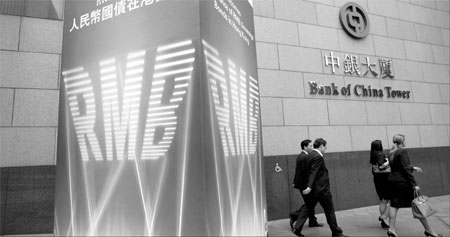Yuan FDI scheme may kick off in Sept: Govt
Updated: 2011-08-31 08:00
By Emma An(HK Edition)
|
|||||||
|
People walk by an advertisement for yuan bonds outside the Bank of China Tower in Hong Kong. Secretary for Financial Services and the Treasury K.C. Chan said the pace at which the offshore yuan business has grown is encouraging. Jerome Favre / Bloomberg |
Vice-premier's package supports financial development: K.C. Chan
K.C. Chan, secretary for financial services and the treasury, said at a forum on Tuesday that the yuan FDI scheme could be implemented as early as September.
"That foreign enterprises will be allowed to make direct investment using the yuan, which Vice-Premier Li Keqiang supported, is very important," Chan said at the event.
During his visit earlier this month, the vice-premier unveiled a package of measures to support financial development in Hong Kong, particularly the expansion of the yuan-denominated asset market. Of the 13 measures related to financial development, eight are about facilitating the development of the offshore yuan business.
Among them is encouraging the use of the yuan by Hong Kong enterprises in making direct investment on the mainland and launching a yuan settlement pilot scheme for foreign direct investment (FDI) in phases. Hong Kong is the major source of FDI on the mainland, accounting for around half of the total.
In a follow-up move following Vice-Premier Li's visit to the city, the Ministry of Commerce issued a consultation document on August 22 about the related notice concerning cross-border yuan settlement for FDI. Chan said he expected yuan FDI trials to start in September.
The past year has seen the offshore yuan business make big strides in Hong Kong. Yuan trade settlement conducted through Hong Kong banks reached 800 billion yuan in the first half of 2011. Yuan deposits in the city expanded by 76 percent from 315 billion yuan ($49 billion) at the beginning of this year to 550 billion yuan at the end of June, increasing by a monthly average of around 40 billion yuan.
The issuance of so-called "dim sum" bonds has also been gathering pace. Thirty-eight entities issued a combined 42.7 billion yuan bonds in the first half of this year, already breaking the record of 35.8 billion yuan worth of bonds issued for the entire year of 2010.
"If the reform and opening up in 1978 was the first step in China's economic reform, then yuan internationalization will be the second step," said Chan.
Chan said the pace at which the offshore yuan business in Hong Kong has grown in the past year is encouraging. Financial innovation and the repatriation of yuan are, in his view, the key matters that need to be addressed.
Hong Kong Exchanges and Clearing Ltd (HKEx) Chief Executive Charles Li said that the demand for and the willingness to accept the mainland currency is rising rapidly, which is going to fuel the growth of yuan products.
But "there is still a long way to go", Li said, referring to the fact that investors interested in investing in the offshore yuan are limited to buying timed deposits and bonds with interest rate yields of less than 3 percent.
emmaan@chinadailyhk.com
China Daily
(HK Edition 08/31/2011 page2)
